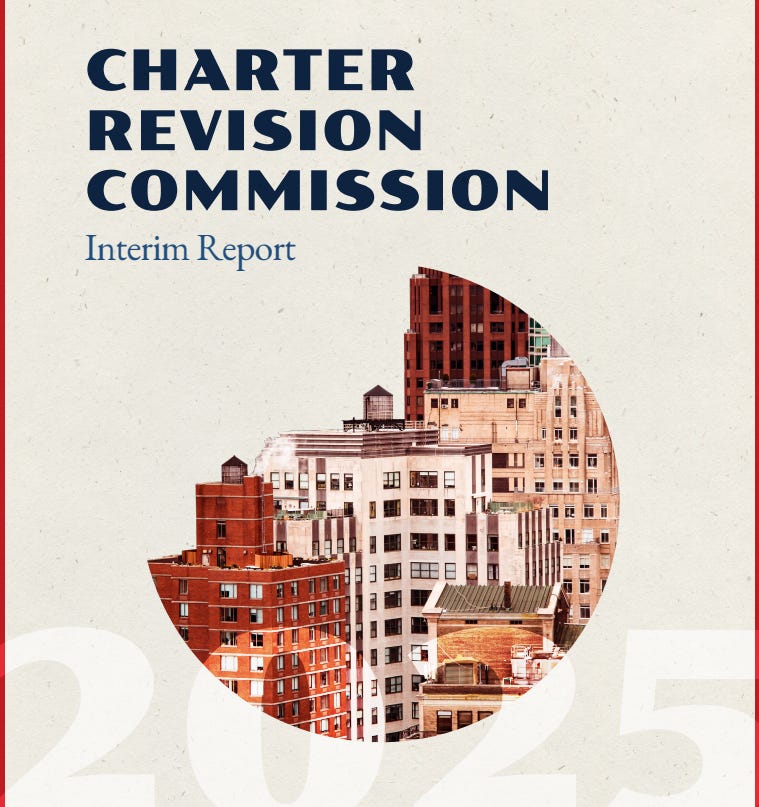NYC historic preservation advocates wrote 49 anti-growth letters
Tomorrow (Tuesday July 15) is the last day for you to submit your letter
A couple months ago, Village Preservation urged neighbors to write to the Charter Revision Commission voicing opposition to streamlining housing development. Here’s the form letter that Village Preservation provided:
I strongly oppose efforts to deregulate development in New York City, or to remove common-sense regulations and oversight which ensure that environmental and other impacts of new development are adequately considered.
I urge the Commission not to seek to strip away necessary checks and balances on the development process in our city, and ensure that neighborhood character and historic resources continue to be considered as important parts of the evaluation of appropriate new development in our neighborhoods.
What’s the Charter Revision Commission and why do we care?
New York City’s housing shortage is at its worst point in more than 50 years– we’re not building nearly enough to house all the people that want to live and work here. And some of the biggest barriers to new housing are neighbors that don’t want it in their backyards.
The NYC Charter Revision Commission is currently weighing proposals to streamline housing production, especially affordable housing. Their proposals will go to the voters in November, but they’re still in the process of getting feedback to shape their recommendations.
Who is Village Preservation?
Village Preservation is an advocacy organization that aims to protect New York’s historic buildings in Lower Manhattan. While their stated goal is protecting neighborhood character, they often oppose rezonings that could unlock much-needed housing. For example, Village Preservation fought the recent SoHo/NoHo Rezoning, arguing (despite the facts) that the rezoning wouldn’t produce affordable housing and would push up prices and reduce diversity. The City Council ultimately approved the rezoning, but only after significant pushback that led to a pared-down version. Village Preservation is part of a coalition of other local historic preservation advocacy groups that seek to honor the past, but often with the consequence of blocking housing development in the city’s most-resourced areas.
I wrote a 3-part series on NYC historic preservation here, with more info about Village Preservation in Part 2 in particular:
49 Village Preservationists submitted anti-growth letters. Why do we care?
In a city of over 8 million people, only ~600 people submitted written testimony to the Charter Revision Commission in Feb-June. And of those 600 letters, the majority were about elections and voting, not about development/ housing. Though 49 anti-growth letters might not sound like much, that’s 8% of the total letters and a significant proportion of the letters that mentioned development. (I’ll admit, I haven’t tried to quantify how many of the 600 letters are pro-growth. The Village Preservation form letters are easy to quantify because they’re all the same.)
Even small numbers can have outsized influence on city policy—especially when those voices are highly organized. When groups like Village Preservation mobilize around protecting the status quo, they create political pressure that makes it harder to pass reforms that would make housing more affordable and accessible.
The Charter Revision Commission is deciding on July 21 whether to put major governance reforms on our 2025 ballot– if opposition to housing is the loudest voice in the room, that could derail proposals to streamline permitting, reduce red tape, or prioritize affordability over aesthetics. 49 people may not sound like much, but when policymakers see no visible counterbalance, those 49 voices can shape the outcome.
Submit your written testimony to the Charter Revision Commission
The Charter Revision Commission is accepting written testimony through July 15.
They will make their final decision on July 21 on which proposals will go to the voters.
Submit your written testimony here by EOD July 15.
Here’s my language that you can steal and tailor to your own values and context:
Dear Charter Revision Commission,
Thank you for the opportunity to comment on the proposed 2025 Charter Revisions.
As a current Brooklyn resident and a former Manhattan Community Board Member, I’m writing to express strong support for Proposals 1, 2, 3, 4, 5, and 6, to make New York City more affordable and democratically representative.
I support Proposals 1-4 to fast track affordable housing, simplify review, strike a better balance in the land use process, and digitize the City Map. The city’s housing shortage demands bold action.
Proposal 1 would make it easier and faster to produce affordable housing, lowering costs and ensuring that all neighborhoods contribute to solving this crisis. This reform is long overdue and essential to reversing the tide of displacement.
Proposal 2 would streamline the approval process for smaller rezonings that add housing, protect against flooding, and create open space. These are exactly the kinds of projects that should not be delayed by red tape, and this proposal would allow the city to respond more nimbly to urgent infrastructure and climate needs.
The current system of member deference gives individual councilmembers outsized power to block citywide priorities. Proposal 3’s new Appeals Board would ensure that development decisions reflect borough-wide and citywide considerations- not just the narrowest political interests.
A unified City Map is a step in the right direction, since the current system can impose significant costs and time on infrastructure, housing, and other projects. Proposal 4’s Digital City Map would allow processes that today take months or even years to occur nearly instantly.
I also support considering Open New York’s recommendations for a fairer and more affordable NYC, many of which are already very well-aligned with the commission’s proposals. I encourage the commission to dedicate additional time to exploring Open New York’s proposal to bring the housing shortage into landmarks decisions.
Proposal 5 is a no-brainer: moving local elections to even years would save the city money and dramatically increase turnout, especially among younger voters, working-class communities, and voters of color. This reform would help ensure that the voices shaping local government reflect the full diversity of our city.
I strongly encourage the Commission to move forward with Proposal 6. Open primaries would enfranchise the 1 million+ New Yorkers who are currently locked out of primary elections due to party registration rules. These voters deserve a voice in the elections that matter most in our one-party-dominated city. Open primaries would boost turnout in local elections, increase electoral competition, and encourage candidates to appeal to a broader cross-section of voters.
I urge the Commission to put all six measures on the November ballot so that voters can weigh in.
Sincerely,
Sachi Takahashi-RialCrown Heights 11225
Submit your written testimony here by EOD July 15.
A fun summer project (if you know how to use AI)
It’d be fun to analyze the sentiment of all of the letters and in-person comments that were submitted to the Charter Revision Commission! This seems like something that AI would be well-positioned to do. In particular, I think it’d be fun to answer the following questions:
How many public comments were in favor of / opposed to changes to land use processes?
How many public comments were in favor of / opposed to changes to local elections?
Once the votes are tallied in November, we’ll be able to tell the sentiments of the general voting population. How are the sentiments of commenters similar or different than the sentiments of the whole voting population?
There are still comments coming in through July 15, so the rest of the written comments will be posted here once ready. Citymeetings.nyc also has video and transcripts of all the live zoom and in-person testimony here. Let me know if this sounds like a fun project to you– I’d be interested in helping too!







Wow, just now realizing if you submit a comment, it gets published alongside comments/reports from policy professionals and civic groups. This is pretty empowering!
I submitted my testimony. thanks Sachi!